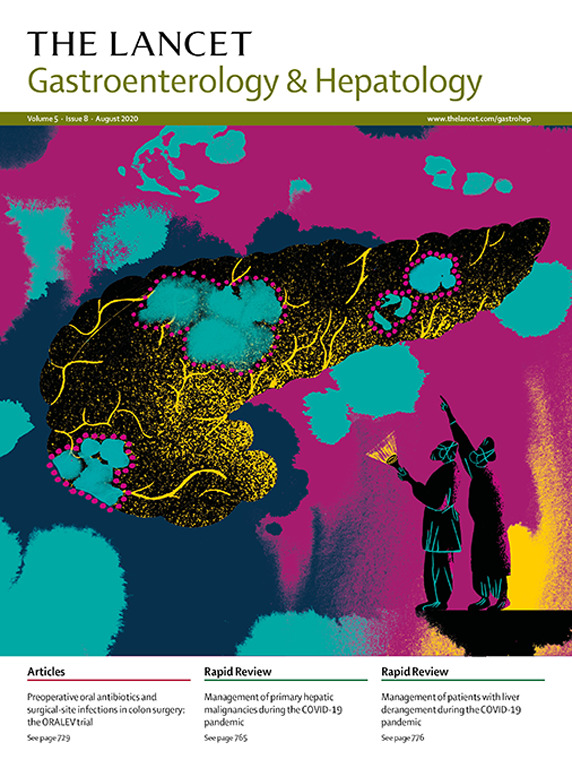大便失禁的核心结果集:在患者、卫生保健专业人员和研究人员中进行的国际德尔菲共识练习
IF 38.6
1区 医学
Q1 GASTROENTEROLOGY & HEPATOLOGY
引用次数: 0
摘要
大便失禁是一种使人衰弱的肛肠疾病,会严重影响一个人的生活质量。大便失禁治疗研究报告结果的可变性使证据的综合复杂化,从而削弱了治疗建议。此外,对临床结果的强调往往忽视了对患者日常生活至关重要的结果。结合不同利益相关者的观点,我们的目标是建立一个核心结果集(COS)——一个在未来的研究中评估成人大便失禁治疗效果时应该测量的最小结果集。遵循COMET计划的指导方针,本研究通过三个步骤进行:通过患者访谈和系统的文献综述确定结果;通过对患者、卫生保健专业人员和研究人员进行两轮德尔菲调查,对结果进行排序和改进;并与相关持份者举行共识会议,最终敲定《财务责任条例》。德尔菲调查的第1轮包括109名参与者(73名保健专业人员和研究人员以及36名患者),第2轮包括74名参与者(分别为54名和20名)。在这两轮中,参与者都以9分的李克特量表对潜在结果的重要性进行排名。在进入第一轮的58个结果和后来增加的3个结果中,27个结果被投票淘汰,其余34个结果在协商一致会议上进行讨论,以最终确定COS。最终的COS包括13个结果:7个与生活质量相关的结果(生活质量、对日常活动的影响、社会功能、治疗满意度、生活享受、尴尬和内心平静)和6个临床结果(大便失禁的严重程度、大便失禁发作次数、紧迫性、大便一致性、不良事件和治疗依从性)。本研究确定了用于大便失禁研究的COS应包括哪些结果,但未来的研究需要为每个结果确定适当的测量仪器,并确定适当的评估时间,这将进一步完善COS实施前的结果定义。一旦这些方面得到明确,COS就可以应用于大便失禁的研究,我们希望最终能改善临床护理。本文章由计算机程序翻译,如有差异,请以英文原文为准。
Faecal incontinence core outcome set: an international Delphi consensus exercise among patients, health-care professionals, and researchers
Faecal incontinence is a debilitating anorectal disorder that can severely affect a person's quality of life. The variability in reported outcomes in studies on treatments for faecal incontinence complicates the synthesis of evidence, thereby weakening treatment recommendations. Furthermore, the emphasis on clinical outcomes often neglects outcomes that are crucial to patients' daily lives. Incorporating diverse stakeholder perspectives, we aimed to develop a core outcome set (COS)—a minimum set of outcomes that should be measured in future studies evaluating the efficacy of a treatment in adults with faecal incontinence. Following guidelines from the COMET initiative, this study proceeded through three steps: identifying outcomes via patient interviews and a systematic literature review; ranking and refining outcomes through two rounds of Delphi surveys involving patients, health-care professionals, and researchers; and finalising the COS through a consensus meeting with relevant stakeholders. Round 1 of the Delphi survey included 109 participants (73 health-care professionals and researchers and 36 patients) and round 2 involved 74 participants (54 and 20, respectively). In both rounds, participants ranked the importance of potential outcomes on a 9-point Likert scale. Of the 58 outcomes that entered round 1 and the three that were later added, 27 outcomes were voted out and the remaining 34 were discussed during a consensus meeting to finalise the COS. The final COS encompasses 13 outcomes: seven quality of life-related outcomes (quality of life, influence on daily activities, social functioning, treatment satisfaction, enjoyment in life, embarrassment, and peace of mind) and six clinical outcomes (severity of faecal incontinence, number of faecal incontinence episodes, urgency, stool consistency, adverse events, and adherence to therapy). This study establishes what outcomes should be included in a COS for use in faecal incontinence research, but future research is needed to identify the appropriate measurement instruments for each outcome and to establish appropriate timing for their assessment, which will further refine outcome definitions before this COS can be implemented. Once these aspects are clarified, the COS can be adopted into faecal incontinence research, which we hope will ultimately improve clinical care.
求助全文
通过发布文献求助,成功后即可免费获取论文全文。
去求助
来源期刊

Lancet Gastroenterology & Hepatology
Medicine-Hepatology
CiteScore
50.30
自引率
1.10%
发文量
0
期刊介绍:
The Lancet Gastroenterology & Hepatology is an authoritative forum for key opinion leaders across medicine, government, and health systems to influence clinical practice, explore global policy, and inform constructive, positive change worldwide.
The Lancet Gastroenterology & Hepatology publishes papers that reflect the rich variety of ongoing clinical research in these fields, especially in the areas of inflammatory bowel diseases, NAFLD and NASH, functional gastrointestinal disorders, digestive cancers, and viral hepatitis.
 求助内容:
求助内容: 应助结果提醒方式:
应助结果提醒方式:


